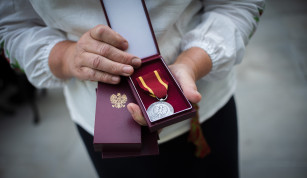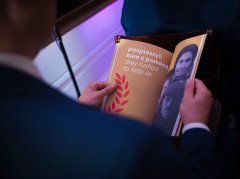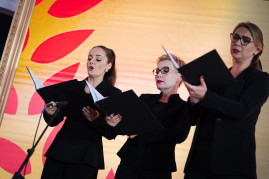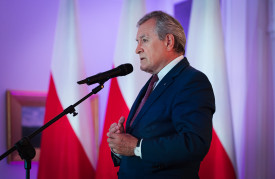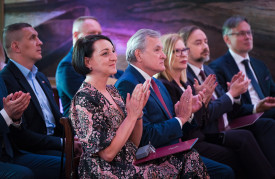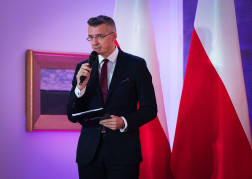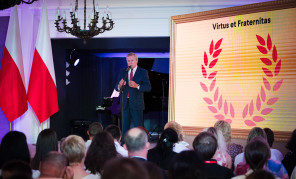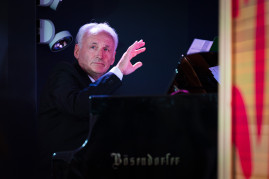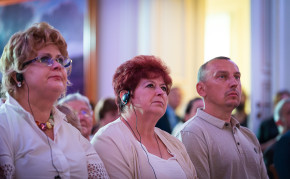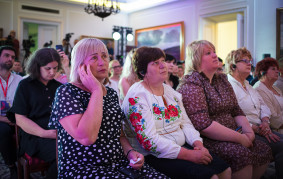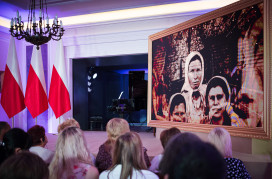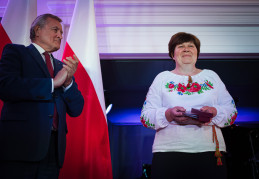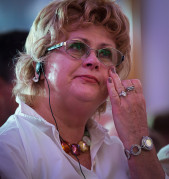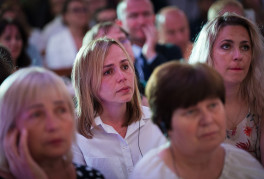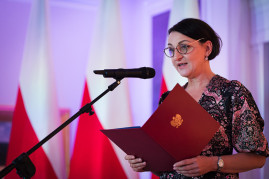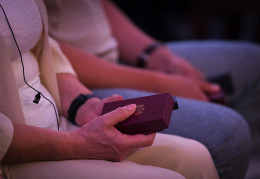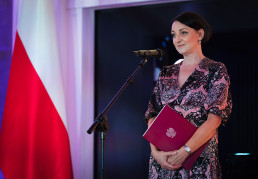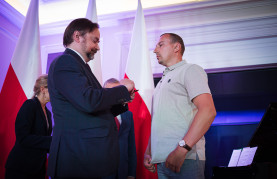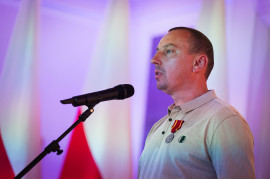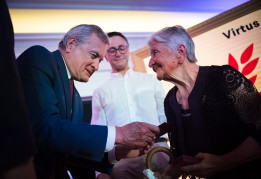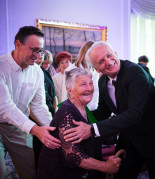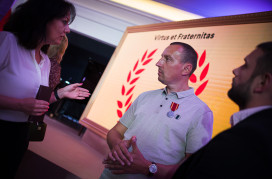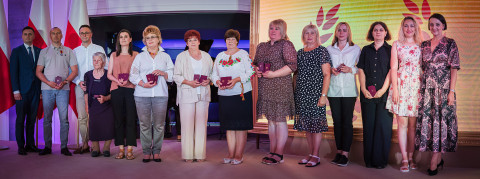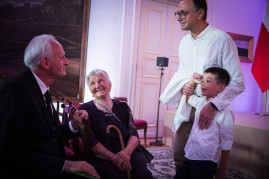Virtus et Fraternitas Medals awarded | Discover the stories of heroic Ukrainians who saved their Polish neighbors during the Volhynian Massacre - Instytut Pileckiego
Virtus et Fraternitas Medals awarded | Discover the stories of heroic Ukrainians who saved their Polish neighbors during the Volhynian Massacre
On 6 July 2023, at the Belweder Palace in Warsaw, fifteen heroic Ukrainians were commemorated for saving their Polish neighbors from death at the hands of the Ukrainian Insurgent Army (faction of the Organization of Ukrainian Nationalists) during the Volhynia Massacre.
11 July 2023 marks the 80th anniversary of the horrific crime that took place in Volhynia in the summer of 1943. By rescuing Poles, Ukrainians endangered their own lives and the lives of their loved ones, and yet they took the risk in the name of love for a fellow human. Thanks to the activities of the Pilecki Institute, we now learn about these kind, courageous people, and commit them to our national memory. The Virtus et Fraternitas Medal was awarded also to Volodymyr Kryzhuk – the keeper of Polish memory in the Volyn region. Today’s ceremony was a moving opportunity for the descendants of the rescuers and the rescued to come together. Starting tomorrow, 7 July, we invite you to visit our outdoor exhibition on Krakowskie Przedmieście Street in Warsaw, devoted to the stories of the Ukrainians awarded with the Virtus et Fraternitas Medal from 2019 onwards.
During the ceremony held at the Belweder Palace, the medals were awarded by Chief of the Cabinet of the President of the Republic of Poland Paweł Szrot and Minister of Culture and National Heritage Prof. Piotr Gliński. The only living recipient of the medal, Volodymyr Kryzhuk, was accompanied by his wife Iryna Kryzhuk. On behalf of those commemorated posthumously, the medal was collected by their family members: Raisa Protsiuk – granddaughter of Semen Bilichuk, Tamara Stepanenko and Viktoria Taranko – relatives of Oksana Karpiuk and Yevhenia and Prokop Bondaruk, Melityna Zhyzhko – granddaughter of Ustyna and Sava Kovtoniuk, Tamara Lysenko – great-granddaughter of Herasym Lukianchuk. Piotr Parfeniuk was represented by Ludmila Hurska and her son Pavlo, while Liubov and Anton Parfeniuk – by great-granddaughters Liubov Maksymiuk and Oksana Martynyk. Tetiana Kovaliuk collected the medals on behalf of Anastasiya and Mykola Koren, and Sofia and Pavlo Kyts. The medal for Paraskeva Padlevska will be awarded at a later date.
Link to the video streaming of the ceremony at the Belweder Palace
In a letter addressed to the recipients of the medal, Prime Minister of the
Republic of Poland, Mateusz Morawiecki, emphasized:
“This year, we have the privilege and honor to learn about those who refused to be rid of their humanity 80 years ago, during the tragic events that took place in Volhynia. They remained a living example of the motto engraved on the medal: the measure of a man is his heart.” He added that “the recipients of the medal were doubtless a treasure to our persecuted compatriots. They remain a treasure to us today. It is a treasure of noble humanity, which inspires gratitude in our hearts and compels us to remember. Therefore, we will pass on its memory to the future generations, as we truly feel there is hardly any greater treasure in this world. I bow my head before those honored today and once more give heartfelt thanks to them and to their families.”
“In those dark times, they admirably attested to the brotherhood which survived the test of terror and hostility between our nations. (…) I trust that we are now writing together a new chapter in Polish-Ukrainian relations”
asserted President Andrzej Duda in a letter read out by Chief of the Cabinet of the President Paweł Szrot.
Oksana Martynyk, great-granddaughter of Liubov and Anton Parfeniuk,
awardees from Volhynia, spoke on behalf of the medal recipients: “I would like to thank you very much for honoring my great-grandparents’ actions from the
period of that horrific war. A similar war today affects all Ukrainians.”
Another recipient of the Virtus et Fraternitas Medal, Volodymyr Kryzhuk, made an emotional statement: “On behalf of all Ukrainians and myself, I would like to give sincere thanks and bow my head before Mister President and the Polish people for the extensive and important help that we have received from you (…). I was born, grew up and continue to live by the beautiful Bug River, where Ukrainians, Poles and even the Olęder people lived in peace for many centuries. (…) Glory to Ukraine! Long live Poland!”
Ulesława Lübek, granddaughter of Aniela and Włodzimierz Dębski, spoke on behalf of the survivors: “I would like to express gratitude to the descendants of the heroes of those horrific days for saving our families. I owe it to them that I stand before you today to pay my respect and give such belated thanks.”
rescued during the Volhynia Massacre by their Ukrainian neighbors, recipients
of the Virtus et Fraternitas Medal. Among the artists who performed alongside
the Maestro were the string quartet of the PRIMUZ Chamber Orchestra and a
vocal ensemble (sextet), who performed the piece “Benedictus” from “Missa
brevis” composed by Krzesimir Dębski at the request of Solvguttene Cor
from Oslo, the “Laudate Dominum” hymn, and “Sarabanda żałobna” from Jerzy Hoffman’s film “Battle of Warsaw 1920.”
Below you will find information on those awarded in 2023.
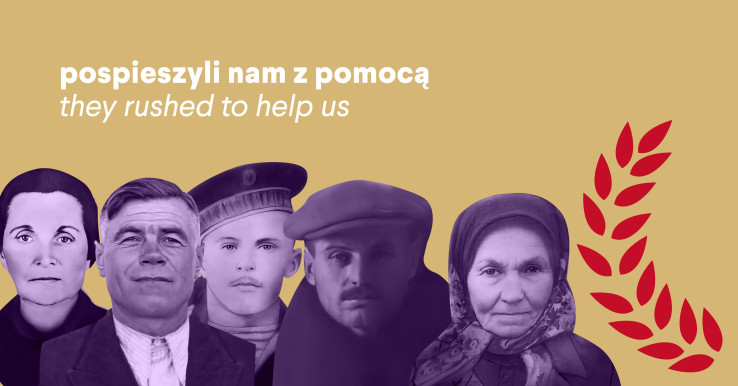
The films presented below can be viewed with Ukrainian and English subtitles on the YT website, after appropriate changes in the settings.
Paraskewa Padlewska
“I asked to be taken to hospital. A Ukrainian woman, Paraska Padlevska, agreed to take me. My future father-in-law, Antoni Sławiński, lent his horses. They loaded me onto a cart, my mother got on as well. We drove by the cemetery, then onto a dirt road to the Oździutycz [now Ozyutychi] route. Through that road we got to Zapust and went left through Trystak and Rudnia [now Rudnya] to the Włodzimierz [now Volodymyr] road. It was quiet everywhere.”
Lubow i Anton Parfeniuk
“[After] the defense during which I got injured, I was taken to her [Liubov’s] farmstead. I lay there, in the barn, until Thursday, when I was taken to a hospital. My father was also hiding there, and this is where we placed our belongings and some of our valuables. (...) Members of the Ukrainian Insurgent Army repeatedly harassed Lubov, demanding that she give up our belongings, but she refused.”
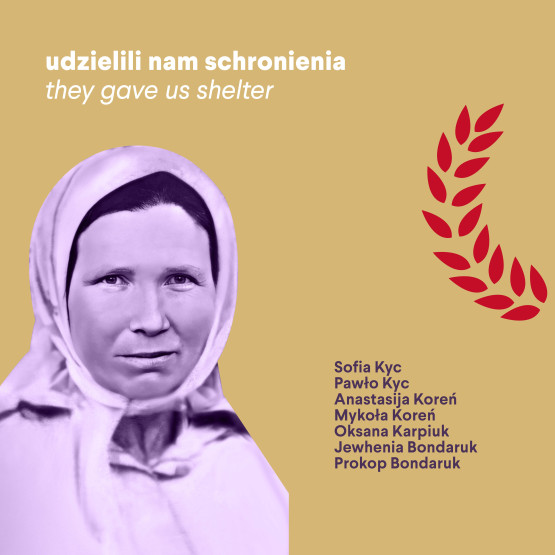
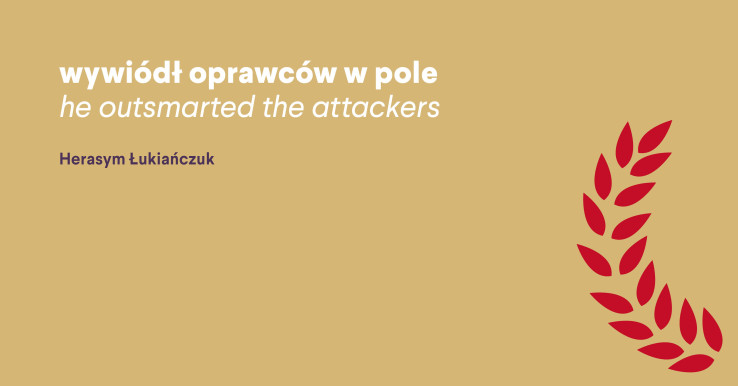
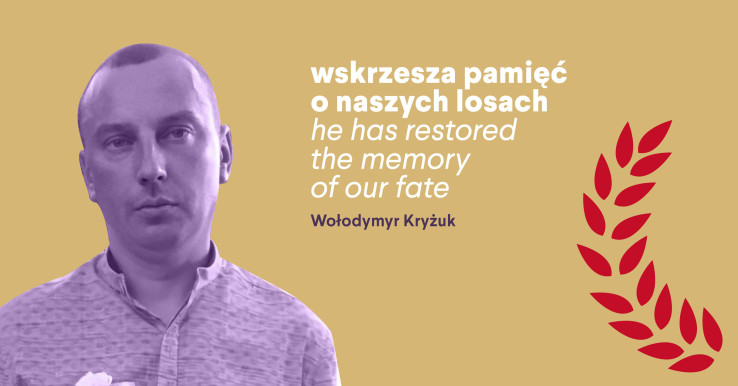
Meet all recipients of the Virtus et Fraternitas Medal
Medal
The Virtus et Fraternitas Medal is awarded by the President of the Republic of Poland as a token of commemoration and gratitude to persons who provided aid and assistance to Polish citizens. It is also bestowed to honor individuals who, by acting spontaneously and voluntarily, keep alive the memory of those of our compatriots who did not survive the war or the forced deportations, and found their graves in foreign soil. This field of activity is particularly important due to the perforce limited scope of institutional help. In the near future we plan to hold successive award ceremonies, during which we shall present other examples of succor closely intertwined with the 20th-century fates of Polish citizens.
We would further like to express our heartfelt gratitude to the numerous people and institutions that have granted support to our effort. We are especially grateful to the originator of the idea, Prime Minister Mateusz Morawiecki, who thereby provided us with the opportunity of commemorating the extraordinary stories of people who rescued Polish citizens.
The Director of the Pilecki Institute, having first obtained a positive opinion from the Council of Memory, submits a motion to the President of the Republic of Poland for bestowal of the medal. If the intended recipient does not hold Polish citizenship or resides permanently abroad, the President asks for the opinion of the Minister competent with respect to Foreign Affairs.
Download
See also
- We know the names of the Virtus et Fraternitas Medal recipients | 2024
We know the names of the Virtus et Fraternitas Medal recipients | 2024
On 17 December 2024, the Virtus et Fraternitas Medal ceremony was held for the sixth time at the Belweder Palace in Warsaw. The award was given to 10 people from the following countries: Austria, Norway, Slovakia and Hungary.
- We now know the names of the Virtus et Fraternitas Medal recipients
We now know the names of the Virtus et Fraternitas Medal recipients
On 20 December 2022, at the Belweder Palace in Warsaw, we honored Ilona Andrássy, Trofim Daneliuk and the Skakalski family, who demonstrated courage and solidarity with the persecuted when Poland was attacked by two murderous regimes, and the Polish citizens were in grave danger.
- Virtus et Franternitas Medals presented
Virtus et Franternitas Medals presented
The third edition of the Virtus et Fraternitas Medal Gala took place on 15 June 2022. This time, at the request of the Director of the Pilecki Institute, the President of the Republic of Poland bestowed medals on a total of 23 people.
- The Virtus et Fraternitas Gala 2021. Meet all the recipients!
The Virtus et Fraternitas Gala 2021. Meet all the recipients!
The President of Poland Andrzej Duda awarded the medals to foreigners who provided aid to Polish citizens during the 20th century, in times of both war and peace.
- Walenty Jabłoński, doctor and an exile in Siberia, is dead
Walenty Jabłoński, doctor and an exile in Siberia, is dead
We are sad to learn of the death of Walenty Jabłoński, an exile in Siberia, participant of the Union of Siberian Exiles in Białystok. He was deported to a kolkhoz in Kazakhstan in 1952, where he was saved from starvation and death by Tassybaj Abdikarimow.
- Virtus et Fraternitas Medal
Virtus et Fraternitas Medal
The Virtus et Fraternitas Medal is a token of gratitude of the Republic of Poland for rescuing its citizens in times of the country’s greatest distress.
- The President of the Republic of Poland decorates recipients with the Virtus et Fraternitas Medal
The President of the Republic of Poland decorates recipients with the Virtus et Fraternitas Medal
The Virtus et Fraternitas Medal has been bestowed for the first time in history in June 2019. The awards were given by the President of the Republic of Poland, Andrzej Duda, acting on a motion of the Pilecki Institute.
